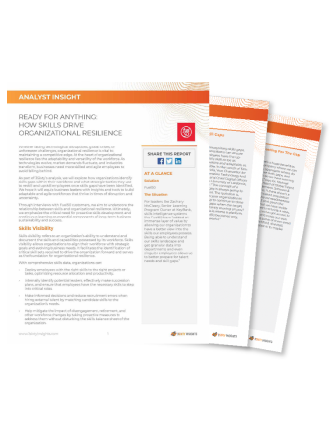Many Employers Are Not Supporting Employees Enough with their Career Development – According to New Study by the HR Research Institute
Exclusive HR research from HR.com’s Research Institute. The research study, The State of Internal Mobility, Succession, and Career Development 2020, was conducted to better understand the state of three crucial talent-focused components of talent mobility and development: internal workforce mobility, succession planning and management, and employee career development.
Obstacles caused by the Covid-19 pandemic have necessitated many companies adapting and restructuring their talent management strategies. Employee development for optimal talent mobility and versatility is more critical than ever before. Regardless, research results indicate that only about half (54%) of human resources (HR) professionals say their organization has a career development process.
The free research report, The State of Internal Mobility, Succession, and Career Development 2020, is now available for download. HR.com’s Research Institute conducted the study of HR professionals to better understand the state of three crucial talent-focused components of talent mobility and development: internal workforce mobility, succession planning, and employee career development.
Further investigation reveals that fully three-quarters of HR professionals agree that employees in their organizations are seeking more career development opportunities, supporting the argument for offering a career development program. Moreover, even among those companies that have career development programs, only about half provide them to all employees.
Clearly, it’s up to management to support programs that help employees in their development, identify candidates for key roles, and groom future leaders.
— Debbie McGrath, Chief Instigator and CEO, HR.com
Additional gaps in optimizing talent mobility are highlighted in the fact that most organizations are dangerously ineffective at succession management. Only 40% of HR professionals agree that their organizations have an effective process for managing succession.
Much of the opportunity for improvement is pointing to managers. One barrier to success may be that organizations do not attach enough importance to their state of internal mobility. Only 40% view it as an important or very important issue in their business. Another barrier is that managers often impede mobility as only 57% say managers are not encouraging of employee movement. Also, just 21% of respondents say their managers have the skills required to help employees develop careers.
“Clearly, it’s up to management to support programs that help employees in their development, identify candidates for key roles, and groom future leaders,” stated Debbie McGrath, Chief Instigator and CEO of HR.com. “There’s much room for improvement in preparing our workforces and leveraging programs that fuel a culture of internal mobility.”
Download the full report which includes details on ten key takeaways to help HR departments gain insights into successfully leveraging effective approaches to succession planning, career development, and internal mobility.
Watch the webinar…
How to create an inclusive talent economy in your organization
Watch the recording of Anne Fulton’s presentation on “Best Practices in Internal Talent Mobility for our New Era”, with special guest Jason Averbook, to take a closer look at the megatrends driving the new talent economy and to learn more about how to create an inclusive talent economy in your organization.












